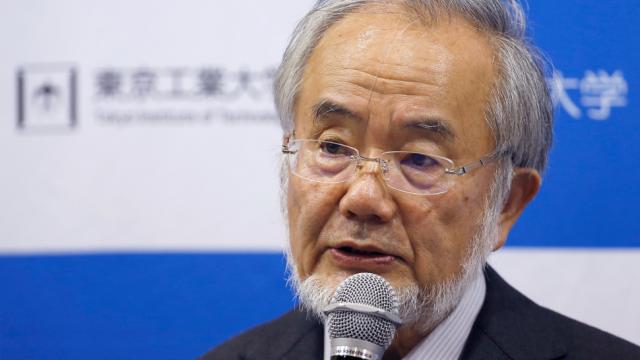This year’s Nobel Prize in Physiology or Medicine has been awarded to Japan’s Yoshinori Ohsumi for furthering our understanding of autophagy, the biological process wherein the body eats some of itself in order to survive.
Nobel Prize winner Yoshinori Ohsumi at a press conference at the Tokyo Institute of Technology in Tokyo Monday, 3 October 2016. (Image: AP)
Ohsumi won the esteemed prize for his discoveries on how cells break down and recycle biological waste that accumulates in the body. This built-in garbage disposal system keeps the body healthy, but sometimes mutations occur, resulting in diseases such as Parkinson’s and cancer. At a press conference held yesterday, Ohsumi said he was surprised to receive the Nobel Prize, but was “extremely honoured”.
Autophagy sounds like something we’d rather avoid, but without it, our bodies wouldn’t be able to degrade and recycle old, worn-out and diseased cellular components. The term literally translates from the Greek term “self eating”, and it’s a concept that first emerged in cellular biology back in the 1960s. But it wasn’t until the work of Ohsumi in the 1990s and his groundbreaking experiments with yeast cells that scientists truly began to understand the mechanisms that drive the process.
Even though we’re alive, our bodies are constantly undergoing an auto-decomposition process, which can be understood as a kind of self-cannibalism. At the same time, however, our bodies are also going through periods of rejuvenation and growth. Autophagy works as a natural defence that allows the body to survive this decomposition process, clearing away old junk and making room for new, fresh cells. Ohsumi discovered critical genes and fundamental biological processes that drive autophagy.
This remarkable recycling process provides fuel for energy and the building blocks required to create new cellular components. Without autophagy, we’d never be able to respond and survive to starvation and other types of stress. For example, autophagy can destroy invading bacteria and viruses that infiltrate cells. Cells also use autophagy to get rid of damaged proteins and organelles — a kind of quality control mechanism that helps us counteract the effects of ageing. Autophagy also plays a critical role during the initial stages of life, contributing to embryonic growth and cell differentiation.
But sometimes the process goes haywire, particularly in the event of a genetic mutation. This can result in Parkinson’s disease, type 2 diabetes and other age-related diseases. Ohsumi’s discoveries could lead to future treatments for some of these conditions.
Ohsumi was awarded eight million Swedish kronor (approximately $1.2 million AUD) by Sweden’s Karolinska Institute for winning the prize. Prizes for physics, chemistry and peace will be awarded later this week.
[Nobel Prize, BBC]
